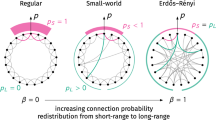Abstract
Substantial research has been devoted to the modelling of the small-world phenomenon that arises in nature as well as human society. Earlier work has focused on the static properties of various small-world models. To examine the routing aspects, Kleinberg proposes a model based on a d-dimensional toroidal lattice with long-range links chosen at random according to the d-harmonic distribution. Kleinberg shows that, by using only local information, the greedy routing algorithm performs in O(lg2 n) expected number of hops. We extend Kleinberg’s small-world model by allowing each node x to have two more random links to nodes chosen uniformly and randomly within \((\lg n)^{\tfrac{2}{d}}\) Manhattan distance from x. Based on this extended model, we then propose an oblivious algorithm that can route messages between any two nodes in O(lgn) expected number of hops. Our routing algorithm keeps only O((lgn)β+1) bits of information on each node, where 1 < β < 2, thus being scalable w.r.t. the network size. To our knowledge, our result is the first to achieve the optimal routing complexity while still keeping a poly-logarithmic number of bits of information stored on each node in the small-world networks.
Similar content being viewed by others
References
Milgram S. The small world problem. Psychology Today, 1967, 61(2): 60–67.
Albert R, Jeong H, Barabasi A L. The diameter of the World Wide Web. Nature, 1999, 401(9): 130–131.
Watts D, Strogatz S. Collective dynamics of small-world networks. Nature, 1998, 393(6684): 440–442.
Aspnes J et al. Fault-tolerant routing in peer-to-peer systems. In Proc. The 21st Annual Symp. Principles of Distributed Computing, Monterey, California, 2002, pp.223–232.
Manku G S, Bawa M, Raghavan P. Symphony: Distributed hashing in a small world. In Proc. The 4th USENIX Symposium on Internet Technologies and Systems, Seattle, Washington, 2003, pp.127–140.
Manku G S, Naor M, Wieder U. Know thy neighbor's neighbor: The power of lookahead in randomized p2p networks. In Proc. The 36th Annual ACM Symposium on Theory of Computing, Chicago, IL, USA, 2004, pp.54–63.
Zhang H, Goel A, Govindan R. Using the small-world model to improve Freenet performance. In Proc. The 21st Annual Joint Conference of the IEEE Computer and Communications Societies, New York, USA, 2002, pp.1228–1237.
Newman M E J. Models of the small world. Journal of Statistical Physics, 2000, 101(3-4): 819–841.
Newman M E J, Watts D J. Scaling and percolation in the small-world network model. Physical Review E, 1999, 60(6): 7332–7342.
Kleinberg J. The small-world phenomenon: An algorithmic perspective. In Proc. The 32nd ACM Symposium on Theory of Computing, Portland, Oregon, 2000, pp.163–170.
Bollobás B, Chung F R K. The diameter of a cycle plus a random matching. SIAM Journal on Discrete Mathematics, 1988, 1(3): 328–333.
Barriére L, Fraigniaud P, Kranakis E, Krizanc D. Efficient routing in networks with long range contacts. In Proc. The 15th International Symposium on Distributed Computing, Lisbon, Portugal, 2001, pp.270–284.
Martel C, Nguyen V. Analyzing Kleinberg's (and other) small-world models. In Proc. The 23rd Annual ACM Symposium on Principles of Distributed Computing, St. John's, Newfoundland, Canada, 2004, pp.179–188.
Lebhar E, Schabanel N. Almost optimal decentralized routing in long-range contact networks. In Proc. The 31st International Colloquium on Automata, Languages and Programming, Turku, Finland, 2004, pp.894–905.
Fraigniaud P, Gavoille C, Paul C. Eclecticism shrinks even small worlds. In Proc. The 23rd Annual Symposium on Principles of Distributed Computing, St. John's, Newfoundland, Canada, 2004, pp.169–178.
Zeng J, Hsu W J, Wang J. Near optimal routing for small-world networks with augmented local awareness. In Proc. The 3rd Int. Symp. Parallel and Distributed Processing and Applications, Nanjing, China, 2005, pp.503–513.
Kemper D, Kleinberg J, Demers A. Spatial gossip and resource location protocols. In Proc. The 33rd Annual ACM Symp. Theory of Computing, Hersonissos, Greece, 2001, pp.163–172.
Homan C M, Istrate G. Small worlds, locality, and flooding on landscapes. Research Report TR-2003-796, Department of Computer Science, University of Rochester, USA, 2003.
Author information
Authors and Affiliations
Corresponding author
Rights and permissions
About this article
Cite this article
Zeng, JY., Hsu, WJ. Optimal Routing in a Small-World Network. J Comput Sci Technol 21, 476–481 (2006). https://doi.org/10.1007/s11390-006-0476-z
Received:
Issue Date:
DOI: https://doi.org/10.1007/s11390-006-0476-z




